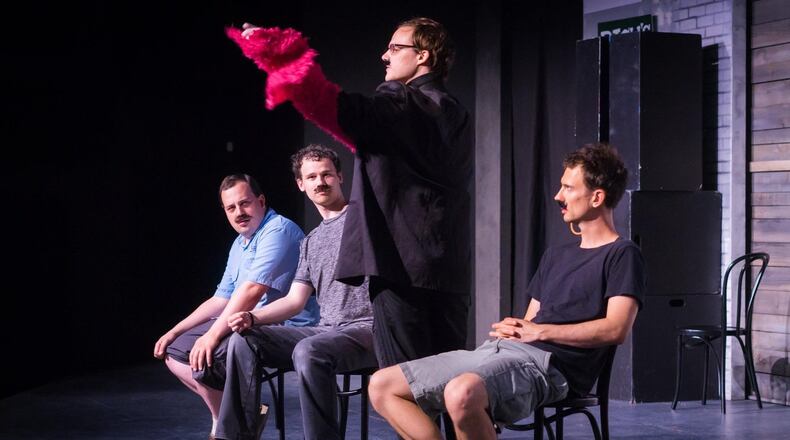Asperger's syndrome and comedy may not seem a likely pairing, but for the Boston-based sketch comedy troupe Asperger's Are Us, the two absolutely go hand in hand.
"Our ideal audience is made up of people who have an aspie sense of humor," says troupe member Noah Britton. Like the other three members of the group, Britton is on the autistic spectrum, and he says the group's sense of the absurd can appeal to everyone, but derives from the unique perspective of people with Asperger's. "If you like Monty Python, if you like Steven Wright, if you like Emo Philips, who we just opened for a few months ago, come see us. You'll love us."
Britton grew up in Sandy Springs and graduated from Westminster in 2001. Throughout his childhood and young adulthood, his Asperger’s went undiagnosed. The syndrome is a condition on the autism spectrum; people with it may be highly functional, but they’re often socially awkward or have personal idiosyncrasies such as all-absorbing interests in specific topics. In his first semester studying at Boston University, Britton discovered what Asperger’s was and got diagnosed a few months later.
After graduation, Britton got a job at a camp for children with Asperger’s. “The first kid I met was (later troupe member) Ethan Finlan, who was 12 at the time,” he says. “He was hilarious. The next summer I came back, and my group was Ethan and Jack and New Michael and a few other kids. For another four years, I worked with those guys in my group. They were my campers, and every day they would make me laugh till I was literally crying.”
Although Britton was about 10 years older than his campers, he says the group always got along as if they were peers. “Imagine if you had never met any Americans your whole life until after you graduated college,” he says. “… Would it bother you that this person is 10 years younger, or are you just like, ‘Oh my God, this person understands baseball and Budweiser and pavement?’ Finally, you realize: These are my people. We became best friends for life, it seems.”
Eventually, however, the campers aged out of the camp. “They didn’t know what to do with themselves,” Britton says. “They were graduating high school, and I said, ‘Let’s start a comedy troupe. We’ll get famous and become movie stars on Netflix.’ Well, I obviously didn’t know that then, but so it has happened.”
Since forming seven years ago, the troupe has had enormous success entertaining audiences with its offbeat sense of humor. A 2016 documentary that aired on Netflix has brought the group even more attention.
Since people with Asperger’s often have difficulty navigating social situations, it’s somewhat surprising to learn that the troupe members have never really had trouble getting up in front of hundreds of people on stage.
“Figuring out someone’s body language is overwhelming and difficult, but if there are 400 people clapping and cheering, it’s very easy for me to understand how they’re feeling,” Britton says. “It’s basically just a reward system. Every joke that gets a laugh, I’ve succeeded. None of us really has stage fright. We would much rather interact with a faceless horde of fans than with one person after another.”
Britton says their performances attract a mix of people with Asperger’s and without, what he refers to as “neurotypicals,” people who are not on the autistic spectrum. “We love neurotypicals coming, but we don’t want them coming out of a sense of pity or guilt or trying to ‘broaden horizons,’” he says. “We want you to come because you’re willing to see the humor in what we’re doing.”
People on the autistic spectrum, he says, tend to internalize rules, and that’s one of the reasons they can be particularly adept at absurdist humor. “We live by rules,” he says. “That’s the way we look at the world, in a computerized, systematic fashion, which means the areas of gray that a lot of neurotypicals live in are lost to us, for better or for worse. Our comedy is based on absurdism, taking reality and changing it to where it’s impossible. A lot of comedians say, ‘This is identifiable, this is relatable, this is true.’ We don’t think that’s funny. We think stuff is funny when it’s not true.”
Britton says that the troupe members, in spite of the challenges that social interaction might present, have always gotten along well with one another. “There are variables we have to consider in our interactions with each other,” he says. “But we’ve known each other for so long now that we understand each other very well. We get along better now than any of us would in a troupe of neurotypicals because we understand each other and our sense of humor is so similar. It’s like having brothers.”
COMEDY PREVIEW
Asperger’s Are Us
8 p.m. March 16. $14.50-$19.50. Dad's Garage. 569 Ezzard St., Atlanta. 404-523-3141, http://dadsgarage.com/shows/aspergers-are-us/.
About the Author
Keep Reading
The Latest
Featured



